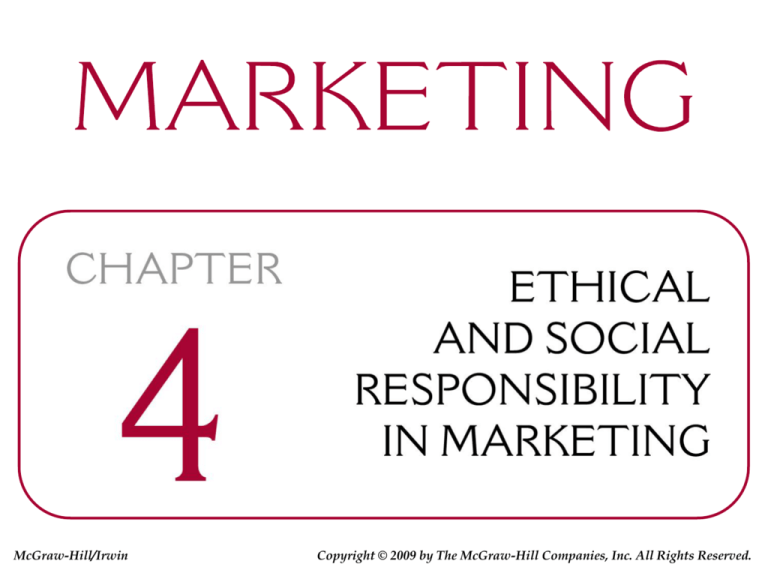
McGraw-Hill/Irwin
Copyright © 2009 by The McGraw-Hill Companies, Inc. All Rights Reserved.
LEARNING OBJECTIVES (LO)
AFTER READING CHAPTER 4, YOU SHOULD BE ABLE TO:
LO1
Explain the differences between legal
and ethical behavior in marketing.
LO2
Identify factors that influence ethical
and unethical marketing decisions.
LO3
Describe the different concepts of
social responsibility.
LO3
Recognize unethical and socially
irresponsible consumer behavior.
4-2
THERE IS MORE TO ANHEUSER-BUSCH
THAN MEETS THE PALATE
4-3
LO1
NATURE AND SIGNIFICANCE
OF MARKETING ETHICS
FRAMEWORK
Ethics
Ethical-Legal Continuum
Laws
• Ethical-Illegal
• Ethical-Legal
• Unethical-Illegal
• Unethical-Legal
Current Perceptions of Ethical Behavior
4-4
FIGURE 4-1 Four ways to classify marketing
decisions according to ethical and legal
relationships
4-5
LO2
ETHICAL MARKETING BEHAVIOR
SOCIETAL CULTURE AND NORMS
Culture
Societal Moral Standards
• Are Relative
• Affect Ethical and Legal Relationships
4-6
FIGURE 4-2 A framework for understanding
ethical behavior
4-7
ETHICAL MARKETING BEHAVIOR
LO2
BUSINESS CULTURE AND INDUSTRY PRACTICES
Business Cultures
Ethics of Exchange
• Caveat Emptor
• Consumer Bill of Rights (1962)
• U.S. Consumer Product Safety Commission
• Federal Trade Commission (FTC)
4-8
ETHICAL MARKETING BEHAVIOR
LO2
BUSINESS CULTURE AND INDUSTRY PRACTICES
Ethics of Competition
• Economic Espionage
• Bribes and Kickbacks
• Corruption Perceptions Index
4-9
MAKING RESPONSIBLE DECISIONS
Corporate Conscience in the Cola War
4-10
LO2
ETHICAL MARKETING BEHAVIOR
CORPORATE CULTURE AND EXPECTATIONS
Corporate Culture
Code of Ethics
Ethical Behavior of Top Management
and Co-Workers
• Whistle-Blowers
4-11
LO2
ETHICAL MARKETING BEHAVIOR
PERSONAL MORAL PHILOSOPHY AND ETHICS
Moral Idealism
Utilitarianism
4-12
LO3
SOCIAL RESPONSIBILITY IN MARKETING
CONCEPTS OF SOCIAL RESPONSIBILITY
Social Responsibility
Profit Responsibility
Stakeholder Responsibility
4-13
FIGURE 4-4 Three concepts of social
responsibility
4-14
LO3
SOCIAL RESPONSIBILITY IN MARKETING
CONCEPTS OF SOCIAL RESPONSIBILITY
Societal Responsibility
• Green Marketing
• ISO 14000
• Cause Marketing
4-15
SOCIAL RESPONSIBILITY IN MARKETING
LO3
THE SOCIAL AUDIT
Social Audit
Sustainable Development
4-16
SOCIAL RESPONSIBILITY IN MARKETING
LO4
CONSUMER ETHICS AND SOCIAL RESPONSIBILITY
Obligations in the Exchange Process
Use and Disposition of Products
Reasons for Unethical Behavior
Reasons for Socially-Responsible
Behavior
4-17
VIDEO CASE 4
STARBUCKS CORPORATION: SERVING
MORE THAN COFFEE
4-18
FIGURE 1 Starbucks mission statement and
guiding principles
4-19
VIDEO CASE 4
Starbucks
1. How does Starbucks’ approach
to social responsibility relate to
the three concepts of social
responsibility described in the
text?
4-20
VIDEO CASE 4
Starbucks
2. What role does sustainable
development play in Starbucks’
approach to social responsibility?
4-21
SUPPLEMENTAL
LECTURE NOTE 4-1
THE FIVE MOST
COMMON KINDS OF
ECONOMIC ESPIONAGE
4-22
IN-CLASS ACTIVITY 4-1
WHAT IS ETHICAL AND
WHAT IS NOT: A SURVEY
OF YOUR OPINIONS
4-23
4-24
IN-CLASS ACTIVITY 4-2
THE ETHICS OF
COMPETITIVE INTELLIGENCE
4-25
Ethics
Ethics are the moral principles
and values that govern the actions
and decisions of an individual or
group.
4-26
Laws
Laws are society’s values and
standards that are enforceable in
the courts.
4-27
Caveat Emptor
Caveat emptor is the legal
concept of “let the buyer beware”
that was pervasive in the
American business culture prior
to the 1960s.
4-28
Consumer Bill of Rights (1962)
The Consumer Bill of Rights
(1962) is a law that codified the
ethics of exchange between
buyers and sellers, including the
rights to safety, to be informed,
to choose, and to be heard.
4-29
Economic Espionage
Economic espionage is the
clandestine collection of trade
secrets or proprietary information
about a company’s competitors.
4-30
Code of Ethics
A code of ethics is a formal
statement of ethical principles
and rules of conduct.
4-31
Whistle-Blowers
Whistle-blowers are employees
who report unethical or illegal
actions of their employers.
4-32
Moral Idealism
Moral idealism is a personal
moral philosophy that considers
certain individual rights or duties
as universal, regardless of the
outcome.
4-33
Utilitarianism
Utilitarianism is a personal moral
philosophy that focuses on the
“greatest good for the greatest
number,” by assessing the costs
and benefits of the consequences
of ethical behavior.
4-34
Social Responsibility
Social responsibility is the idea
that organizations are part of a
larger society and are accountable
to that society for their actions.
4-35
Green Marketing
Green marketing consists of
marketing efforts to produce,
promote, and reclaim
environmentally sensitive
products.
4-36
ISO 14000
ISO 14000 consists of worldwide
standards for environmental
quality and green marketing
practices developed by the
International Standards
Organization (ISO).
4-37
Cause Marketing
Cause marketing occurs when
the charitable contributions of a
firm are tied directly to the
customer revenues produced
through the promotion of one of
its products.
4-38
Social Audit
A social audit consists of a
systematic assessment of a firm’s
objectives, strategies, and
performance in terms of social
responsibility.
4-39
Sustainable Development
Sustainable development
involves conducting business in
a way that protects the natural
environment while making
economic progress.
4-40







